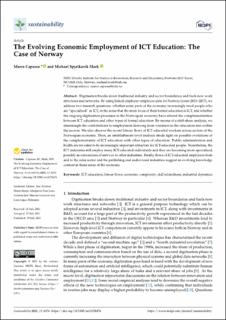The evolving economic employment of ICT education: The case of Norway
Peer reviewed, Journal article
Published version

View/
Date
2021Metadata
Show full item recordCollections
Original version
Capasso, M. & Mark, M. S. (2021). The evolving economic employment of ICT education: The case of Norway. Sustainability, 13(15), 8476. 10.3390/su13158476Abstract
Digitisation breaks down traditional industry and sector boundaries and fuels new work structures and networks. By using linked employer–employee data for Norway (years 2013–2017), we address two research questions: whether some parts of the economy increasingly need people who are “specialised” in ICT, in the sense that the main focus of their formal education is ICT, and whether the ongoing digitisation processes in the Norwegian economy have altered the complementarities between ICT education and other types of formal education. By means of a shift-share analysis, we disentangle the contributions to employment deriving from variation in the education mix within the sectors. We also observe the recent labour flows of ICT-educated workers across sectors of the Norwegian economy. Then, an establishment-level analysis sheds light on possible evolutions of the complementarity of ICT education with other types of education. Public administration and health are revealed to be increasingly important attractors for ICT-educated people. Nonetheless, the ICT industries still employ many ICT-educated individuals and they are becoming more specialised, possibly as outsourcees of services to other industries. Finally, flows of ICT-educated employees from and to the sales sector and the publishing and audiovisual industries suggest an evolving knowledge content in these areas of the economy.
